天津市第一中学2017-2018学年高二上学期期中考试英语试题Word版含答案
- 格式:doc
- 大小:1.71 MB
- 文档页数:19
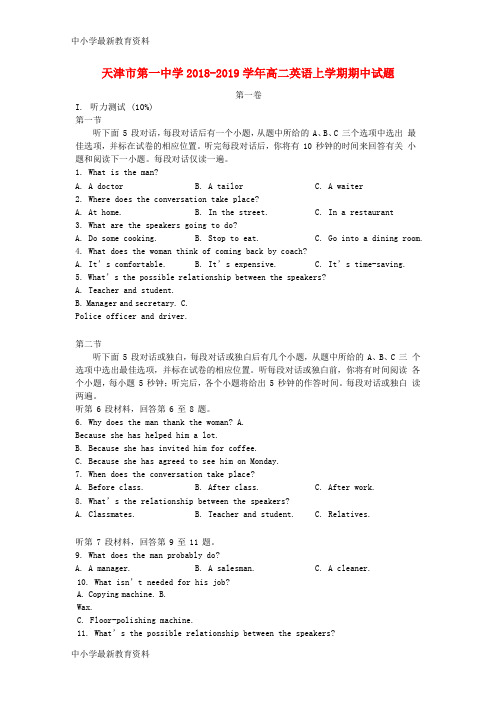
天津市第一中学2018-2019学年高二英语上学期期中试题第一卷I. 听力测试(10%)第一节听下面 5 段对话,每段对话后有一个小题,从题中所给的 A、B、C 三个选项中选出最佳选项,并标在试卷的相应位置。
听完每段对话后,你将有 10 秒钟的时间来回答有关小题和阅读下一小题。
每段对话仅读一遍。
1. What is the man?A. A doctorB. A tailorC. A waiter2. Where does the conversation take place?A. At home.B. In the street.C. In a restaurant3. What are the speakers going to do?A. Do some cooking.B. Stop to eat.C. Go into a dining room.4. What does the woman think of coming back by coach?A. It’s comfortable.B. It’s expensive.C. It’s time-saving.5. What’s the possible relationship between the speakers?A. Teacher and student.B. Manager and secretary.C.Police officer and driver.第二节听下面 5 段对话或独白,每段对话或独白后有几个小题,从题中所给的 A、B、C 三个选项中选出最佳选项,并标在试卷的相应位置。
听每段对话或独白前,你将有时间阅读各个小题,每小题 5 秒钟;听完后,各个小题将给出 5 秒钟的作答时间。
每段对话或独白读两遍。
听第 6 段材料,回答第 6 至 8 题。
6. Why does the man thank the woman? A.Because she has helped him a lot.B. Because she has invited him for coffee.C. Because she has agreed to see him on Monday.7. When does the conversation take place?A. Before class.B. After class.C. After work.8. What’s the relationship between the speakers?A. Classmates.B. Teacher and student.C. Relatives.听第 7 段材料,回答第 9 至 11 题。
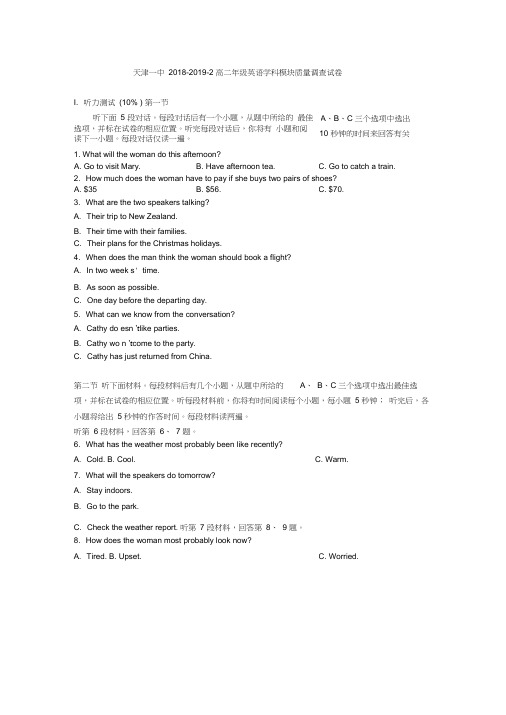
天津一中 2018-2019-2 高二年级英语学科模块质量调查试卷I. 听力测试 (10% ) 第一节听下面 5 段对话。
每段对话后有一个小题,从题中所给的 最佳选项,并标在试卷的相应位置。
听完每段对话后,你将有 小题和阅读下一小题。
每段对话仅读一遍。
1. What will the woman do this afternoon?2. How much does the woman have to pay if she buys two pairs of shoes?3. What are the two speakers talking? A. Their trip to New Zealand.B. Their time with their families.C. Their plans for the Christmas holidays.4. When does the man think the woman should book a flight? A. In two week s ' time. B. As soon as possible.C. One day before the departing day. 5. What can we know from the conversation? A. Cathy do esn 't like parties. B. Cathy wo n 't come to the party. C. Cathy has just returned from China.第二节 听下面材料。
每段材料后有几个小题,从题中所给的 A 、 B 、C 三个选项中选出最佳选项,并标在试卷的相应位置。
听每段材料前,你将有时间阅读每个小题,每小题 5 秒钟; 听完后,各小题将给出 5 秒钟的作答时间。
每段材料读两遍。
听第 6 段材料,回答第 6、 7 题。
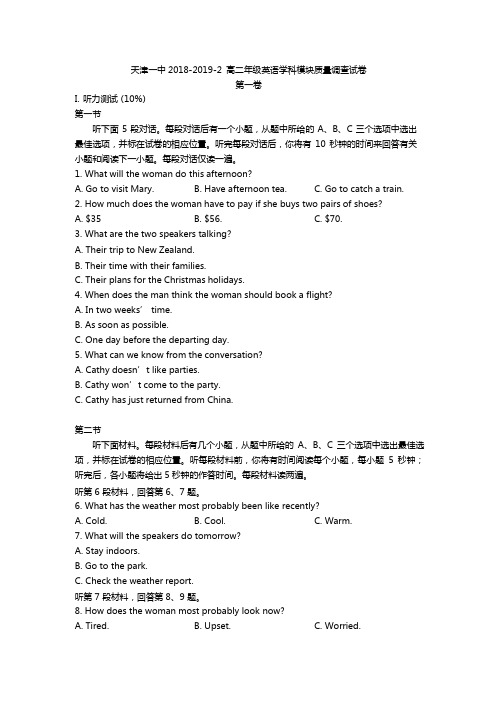
天津一中 2018-2019-2 高二年级英语学科模块质量调查试卷第一卷I. 听力测试(10%)第一节听下面 5 段对话。
每段对话后有一个小题,从题中所给的 A、B、C 三个选项中选出最佳选项,并标在试卷的相应位置。
听完每段对话后,你将有10 秒钟的时间来回答有关小题和阅读下一小题。
每段对话仅读一遍。
1. What will the woman do this afternoon?A. Go to visit Mary.B. Have afternoon tea.C. Go to catch a train.2. How much does the woman have to pay if she buys two pairs of shoes?A. $35B. $56.C. $70.3. What are the two speakers talking?A. Their trip to New Zealand.B. Their time with their families.C. Their plans for the Christmas holidays.4. When does the man think the woman should book a flight?A. In two week s’ time.B. As soon as possible.C. One day before the departing day.5. What can we know from the conversation?A. Cathy do esn’t like parties.B. Cathy wo n’t come to the party.C. Cathy has just returned from China.第二节听下面材料。
每段材料后有几个小题,从题中所给的A、B、C 三个选项中选出最佳选项,并标在试卷的相应位置。
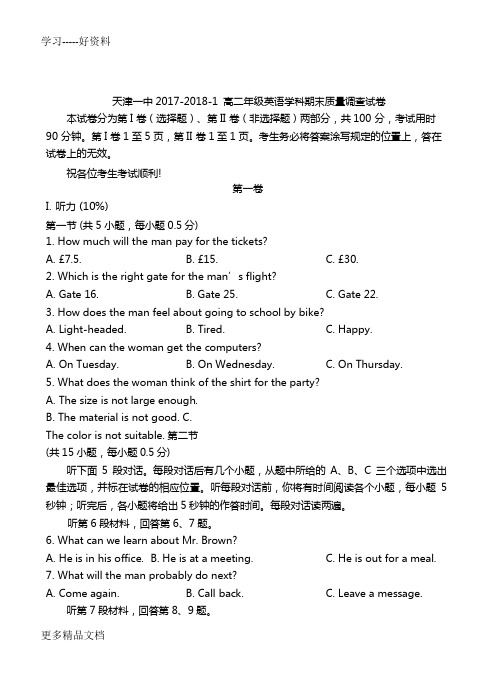
天津一中 2017-2018-1 高二年级英语学科期末质量调查试卷本试卷分为第 I 卷(选择题)、第 II 卷(非选择题)两部分,共 100 分,考试用时90 分钟。
第 I 卷 1 至 5 页,第 II 卷 1 至 1 页。
考生务必将答案涂写规定的位置上,答在试卷上的无效。
祝各位考生考试顺利!第一卷I. 听力(10%)第一节 (共 5 小题,每小题 0.5 分)1. How much will the man pay for the tickets?A. £7.5.B. £15.C. £30.2. Which is the right gate for the ma n’s flight?A. Gate 16.B. Gate 25.C. Gate 22.3. How does the man feel about going to school by bike?A. Light-headed.B. Tired.C. Happy.4. When can the woman get the computers?A. On Tuesday.B. On Wednesday.C. On Thursday.5. What does the woman think of the shirt for the party?A. The size is not large enough.B. The material is not good.C.The color is not suitable. 第二节(共 15 小题,每小题 0.5 分)听下面5 段对话。
每段对话后有几个小题,从题中所给的A、B、C 三个选项中选出最佳选项,并标在试卷的相应位置。
听每段对话前,你将有时间阅读各个小题,每小题5 秒钟;听完后,各小题将给出 5 秒钟的作答时间。
每段对话读两遍。
听第 6 段材料,回答第 6、7 题。
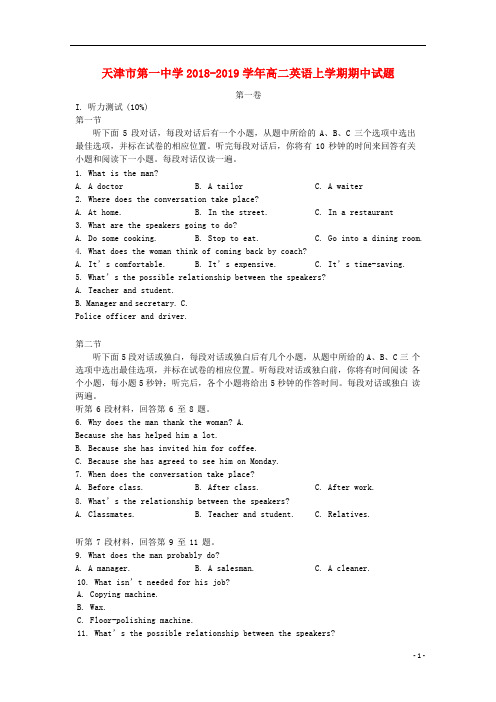
天津市第一中学2018-2019学年高二英语上学期期中试题第一卷I. 听力测试(10%)第一节听下面 5 段对话,每段对话后有一个小题,从题中所给的 A、B、C 三个选项中选出最佳选项,并标在试卷的相应位置。
听完每段对话后,你将有 10 秒钟的时间来回答有关小题和阅读下一小题。
每段对话仅读一遍。
1. What is the man?A. A doctorB. A tailorC. A waiter2. Where does the conversation take place?A. At home.B. In the street.C. In a restaurant3. What are the speakers going to do?A. Do some cooking.B. Stop to eat.C. Go into a dining room.4. What does the woman think of coming back by coach?A. It’s comfortable.B. It’s expensive.C. It’s time-saving.5. What’s the possible relationship between the speakers?A. Teacher and student.B. Manager and secretary.C.Police officer and driver.第二节听下面5 段对话或独白,每段对话或独白后有几个小题,从题中所给的A、B、C 三个选项中选出最佳选项,并标在试卷的相应位置。
听每段对话或独白前,你将有时间阅读各个小题,每小题5 秒钟;听完后,各个小题将给出5 秒钟的作答时间。
每段对话或独白读两遍。
听第 6 段材料,回答第 6 至 8 题。
6. Why does the man thank the woman? A.Because she has helped him a lot.B. Because she has invited him for coffee.C. Because she has agreed to see him on Monday.7. When does the conversation take place?A. Before class.B. After class.C. After work.8. What’s the relationship between the speakers?A. Classmates.B. Teacher and student.C. Relatives.听第 7 段材料,回答第 9 至 11 题。

2017-2018学年天津市⼀中⾼⼆下学期期末考试复习英语试卷(附答案)2017-2018学年天津市⼀中⾼⼆下学期期末考试复习英语试卷(附答案)本试卷分为第 I 卷(选择题)、第 II 卷(⾮选择题)两部分,共100 分,考试⽤时90 分钟。
第I 卷 1 ⾄ 4 页,第II 卷 1 ⾄ 1页。
考⽣务必将答案涂写规定的位置上,答在试卷上的⽆效。
祝各位考⽣考试顺利!I. 听⼒(10%)第⼀节 (共 5 ⼩题)第⼀卷听下⾯ 5 段对话。
每段对话后有⼀个⼩题,从题中所给的 A、B、C 三个选项中选出最佳选项,并标在试卷的相应位置。
听完每段对话后,你都有 10 秒钟的时间来回答有关⼩题和阅读下⼀⼩题。
每段对话仅读⼀遍。
1. What time is it now?A. 7:25B. 7:35C. 7:452. What did the woman think of the game?A. Fantastic.B. Boring.C. Not bad.3. What’s probably wrong with the woman?A. She has a stomachache.B. Her leg is broken.C. She has a fever.4. How did the woman get back? A.Someone gave her a lift.B. She drove her car home.C. She rode her bike home.5. What does the woman look like?A. Short, wearing glasses.B. Tall, wearing no glasses.C. Short, wearing no glasses.第⼆节 (共 15 ⼩题)听下⾯ 5 段对话或独⽩。
每段对话或独⽩后有⼏个⼩题,从题中所给的 A、B、C 三个选项中选出最佳选项。
天津市武清区2017-2018学年高二英语上学期期中试题第Ⅰ卷(三大题,共75分)第一部分听力理解(共两节,满分15分)第一节(共5小题;每小题1分,满分5分)听下面5段对话。
每段对话后有一个小题,从题中所给的A、B、C三个选项中选出最佳选项。
听完每段对话后,你都有10秒钟的时间来回答有关小题和阅读下一小题。
每段对话仅读一遍。
1.What is Paul going to do?A.Go to a party.B.Do his homework.C.Catch a bus home.2.What is the speakers' relationship?A.Husband and wife.B.Shop assistant and customer.C.Waitress and customer.3.How much will the man haveto pay?A.90 cents.B.19 cents.C.45 cents.4.What season is it now?A.Spring.B.Summer.C.Autumn.5.What will the man do in aminute?A.Have a rest.B.Help to cook supper.C.Go home.第二节(共10小题;每小题1分,满分10分)听下面三段对话或独白,按要求完成每段材料后的几个小题。
听每段材料前,你将有时间阅读每个小题,每小题5秒钟;听完后,各小题将给出5秒钟的作答时间。
每段材料读两遍。
听第6段材料,回答6至8小题。
6.What happened to the woman's son?A.He fell offhis motorcycle.B.He was hit by a motorcycle.C.He fell over when going to school.7.How about her son's injury?A.Serious.B.Slight.C.Not mentioned.8.Why is the woman still worried?A.Her son can't gotoschool.B.Her son will never walk again.C.She has no time to look after her son.听第7段材料,回答9至11小题。
天津一中 2017-2018-2 高二年级英语学科期末质量调查试卷本试卷分为第 I 卷(选择题)、第 II 卷(非选择题)两部分,共 100 分,考试用时90 分钟。
第 I 卷 1 至 5 页,第 II 卷 1 页。
考生务必将答案涂写规定的位置上,答在试卷上的无效。
祝各位考生考试顺利!第一卷I. 听力 (10%)第一节听下面 5 段对话。
每段对话后有一个小题,从题中所给的 A、B、C 三个选项中选出最佳选项,并标在试卷的相应位置。
听完每段对话后,你将有 10 秒钟的时间来回答有关小题和阅读下一小题。
每段对话仅读一遍。
1. What is the weather like?A. It’s raining.B. It’s cloudy.C. It’s sunny.【答案】B【解析】【详解】此题为听力题,解析略。
2. Who will go to China next month?A. Lucy.B. Alice.C. Richard.【答案】A【解析】【详解】此题为听力题,解析略。
3. 音频What are the speakers talking about?A. The men’s sister.B. A film.C. An actor.【答案】C【解析】【详解】此题为听力题,解析略。
4. 音频Where will the speakers meet?A. In Room 340.B. In Room 314.C. In Room 223.【答案】A【解析】【详解】此题为听力题,解析略。
5. 音频Where does the conversation most probably take place?A. In a restaurant.B. In an office.C. At home.【答案】B【解析】【详解】此题为听力题,解析略。
第二节听下面材料。
每段材料后有几个小题,从题中所给的 A、B、C 三个选项中选出最佳选项,并标在试卷的相应位置。
天津市武清区2017-2018学年高二英语上学期期中试题第Ⅰ卷(三大题,共75分)第一部分听力理解(共两节,满分15分)第一节(共5小题;每小题1分,满分5分)听下面5段对话。
每段对话后有一个小题,从题中所给的A、B、C三个选项中选出最佳选项。
听完每段对话后,你都有10秒钟的时间来回答有关小题和阅读下一小题。
每段对话仅读一遍。
1.What is Paul going to do?A.Go to a party.B.Do his homework.C.Catch a bus home.2.What is the speakers' relationship?A.Husband and wife.B.Shop assistant and customer.C.Waitress and customer.3.How much will the man have to pay?A.90 cents.B.19 cents.C.45 cents.4.What season is it now?A.Spring.B.Summer.C.Autumn.5.What will the man do in a minute?A.Have a rest.B.Help to cook supper.C.Go home.第二节(共10小题;每小题1分,满分10分)听下面三段对话或独白,按要求完成每段材料后的几个小题。
听每段材料前,你将有时间阅读每个小题,每小题5秒钟;听完后,各小题将给出5秒钟的作答时间。
每段材料读两遍。
听第6段材料,回答6至8小题。
6.What happened to the woman's son?A.He fell off his motorcycle.B.He was hit by a motorcycle.C.He fell over when going to school.7.How about her son's injury?A.Serious.B.Slight.C.Not mentioned.8.Why is the woman still worried?A.Her son can't go to school.B.Her son will never walk again.C.She has no time to look after her son.听第7段材料,回答9至11小题。
天津一中、益中学校 2017-2018-1 高二年级英语学科模块质量调查试卷本试卷分为第 I 卷(选择题)、第 II 卷(非选择题)两部分,共 100 分,考试用时90 分钟。
第I 卷1 至4 页,第II 卷1 至1 页。
考生务必将答案涂写规定的位置上,答在试卷上的无效。
祝各位考生考试顺利!I. 听力(10%)第一节(共 5 小题)第一卷听下面 5 段对话。
每段对话后有一个小题,从题中所给的 A、B、C 三个选项中选出最佳选项,并标在试卷的相应位置。
听完每段对话后,你都有10 秒钟的时间来回答有关小题和阅读下一小题。
每段对话仅读一遍。
1. What are they talking about?A. A dictionary.B. A bookshop.C. A movie.2. When will the meeting begin?A. 9:00.B. 10:00.C. 12:00.3. How much is the woman going to pay for the hat?A. $80.B. $72.C. $88.4. What do you think the man has bought?A. A bowl of ice cream.B. A nice dress.C. Some strawberries.5. What can we learn about the woman in the conversation? A.She is a good friend of Mary’s.B. She never uses make-up herself.C. She was unhappy to hear the man’s comment.第二节(共 15 小题)听下面 5 段对话或独白。
每段对话或独白后有几个小题,从题中所给的 A、B、C 三个选项中选出最佳选项。
听每段对话或独白前,你将有时间阅读各个小题,每小题5 秒钟;听完后,各小题将给出 5 秒钟的作答时间。
每段对话或独白读两遍。
听第 6 段材料,回答第 6、7 题。
6. Where is the conversation most probably taking place?A. At home.B. On a bus.C. In the bank.7. Why do the two speakers want to buy a car? A.They want to save money.B. The woman’s office is too far from her home.C.The man lives too far away from his office.听第 7 段材料,回答第 8、9 题。
8. How does Bob feel about his interview?A. Worried.B. Confident.C. Uncertain.9. What makes him think he has a very good chance?A. He did better than the others in the interview.B.He was the only one with related experience. C.The director seemed to like him.听第 8 段材料,回答第 10 至 12 题。
10. Who are the speakers?A. Office workers.B. College students.C. Senior students.11. What can we learn about the woman’s grandpa?A. He serves in the army.B. He runs a small farm.C. He works on a farm.12. Why does the woman often go to the country? A.She enjoys the beautiful scenery in the country. B.She has to help her grandpa with his farm work. C.She wants to stay with her grandpa.听第 9 段材料,回答第 13 至 16 题。
13. What are the man and his friend doing in the street? A.They are looking for a park.B. They are looking for a bank.C. They are looking for a river.14. What’s the problem with the leaflet? A.It gives the wrong information.B. The details it gives are not clear.C. There’s no information about the concert in it.15. How could you describe the man and his friends?A. Natives.B. Sports fans.C. Tourists.16. Where will the man and his friends probably end up going?A. The park downtown.B. Lakeshore Park.C. Back to the hotel. 听第 10 段材料,回答第 17 至 20 题。
17. What is the speaker talking about?A. How to become a good writer.B. How to write a diary.C. How to organize a story.18. How can writing a diary be helpful to people? A.It can distract people from their daily worries. B. Itcan leave space for people to think.C. It can improve people’s writing ability.19. Where does the speaker like to write her journal?A. In a blog.B. On computer.C. In a notebook.20. What form does the speaker suggest using?A. In any form you like.B. In a letter form.C. In the first person.II. 单项选择(20%)21. –Do you like ties, sir?–I like neither of them. Please show me third one.A. the; theB. the; aC. /; theD. /; a22. –_ ! We are coming late.–But I can’t find my ticket.A. Get a move onB. Take your timeC. Help yourselfD. Go straight ahead23. The magazine is __reading, so he advised me it.A. well worth; to buyB. very worth; buyingC. worthy; buyingD. worthy; to buy24. The dying man sounded out of breath, he had been running a long way. A. like B. as though C. as D. even if25. the two designs, and you will find what problem there is with yours. A. Comparing B. Compared C. To compare D. Compare26. New Zealandsurrounded by sea.a north island and a south island, both of which areA. consists ofB. is consisted ofC. consisting ofD. consisted of27. He had just sent an email to his pal on the Internet the system broke down.A. whileB. whenC. afterD. since28. Research findings show we spend about two hours dreaming every night, no matter what we _ during the day.A. may be doingB. could have doneC. must have doneD. might have done29. –Who is the girl standing over there?–Well, if you know, her name is Mabel.A. mayB. canC. mustD. shall30. I hate when people talk with their mouths full.A. itB. thatC. theseD. them31. –He looks so and the kids are really scared.–He often uses that look to frighten them.A. frightened; frightenedB. frightened; frighteningC. frightening; frightenedD. frightening; frightening32. –Do you think the movie is wonderful?–Yes. It’s quite .A. nothingB. somethingC. anythingD. everything33. The way he did it was different _ we were used to.A. in whichB. in whatC. from whatD. from which34. –We didn’t see Smith attending the lecture.–No one him about a lecture today.A. told; there to beB. had told; there to beC. told; there wasD. had told; there being35. To keep healthy, Professor Johnson cycling as a regular form of exercise after he retired.A. took upB. took overC. carried outD. made up36. The British use prepositions Americans sometimes omit them.A. whenB. whichC. thatD. where37. A heavy snow fell on the first day of this year;you'll imagine what difficulty we had home in the snow.A. walkedB. walkC. to walkD. walking38. The girl in bed _ to us that she had _ the book on the bookshelf. A. lay; lied; lay B. lying; lay; laid C. lying; lied; laid D. lied; lied; laid39. Hearing the steps of their teacher on the floor, the students pretended something attentively.A. having readB. readingC. to readingD. to be reading40. He tried many times to cross the border to a neighboring country without a permit, each time.A. being caughtB. only to be caughtC. only to catchD. only catchingIII. 完形填空(20%)Did you feel like the negative remark was more influential than the compliments that you received earlier? If the answer to the question is “Yes”, then you are not _41 _. There are many people feeling like this, but you all need to learn how to _42 _ negative remarks.When negative remarks come about, you remind yourself that it is 43 _ someone’s opinion and everyone is entitled (使享有权利) to express their opinions. They have the 44_ to say anything they want to say. Meantime, you choose to do whatever you think is correct and 45 the negative ones. When I was a kid, I heard a saying --- “A barking dog won’t stop a moving carriage.”That is to say if a carriage is moving and a dog is _46 it while barking, the carriage won’t _47_ because of that dog’s barking.One morning, as I was 48 to work from the nearest train station, a drunken man approached me. _49 , he grasped my left arm and said, “Hey, man. Your clothes are so ugly.”Then he 50_ my arm, and walked off. A few people on the street stopped, 51_ at me, and were most likely expectingareaction from me. I replied _52 “Good morning to you, sir”, and _53 . The people watching this 54_ started laughing. I just walked away without paying any attention to them. About an hour later, a 55_ and I went back on that street to buy some fruits. Guess what? We saw the police speaking to that man, and he was in handcuffs (手铐). I told my workmate what had happened to me 56 _.In an article in Psychology T oday, Dr Raj Raghunathan says, “The 57_ between ordinary people and extraordinary (非凡的) people is simple. Extraordinary people choose to listen to their _58 and ignore other people’s negativity.”They see things differently. _59 _ you should learn how to dealwith negative remarks and not let them 60_ your emotions and thoughts.41. A. confident B. alone C. calm D. correct42. A. make B. avoid C. stop D. handle43. A. always B. possibly C. usually D. only44. A. right B. reason C. time D. ability45. A. oppose B. notice C. ignore D. solve46. A. walking around B. looking for C. running after D. passing by47. A. stop B. close C. move D. follow48. A. driving B. riding C. running D. walking49. A. UnfortunatelB. DisappointedlyC. SuddenlyD. Pleasantlyy50. A. hurt B. let go of C. caught D. broke away from51. A. looked B. shouted C. swore D. laughed52. A. weakly B. slowly C. angrily D. politely53. A. cried B. left C. smiled D. agreed54. A. performance B. activity C. turn D. accident55. A. friend B. colleague C. leader D. policeman56. A. earlier B. expectedly C. again D. unwillingly57. A. secret B. relationship C. difference D. similarity58. A. advice B. experience C. heart D. positivity59. A. And B. So C. When D. ButB. showC. changeD. mix60. A. controlIV. 阅读理解 (30%)AFrom visiting museums to watching Changing the Guard, there are some amazing experiences for you to get while in London. Here we pick some of thebest free activities in London.Changing the GuardFor a display of British ceremony, watch Changing the Guard outside Buckingham Palace. This is where one member of Queen’s Guards exchanges duty with the old guard. Both guards are dressed in traditional red uniform and bearskin hats, and the handover is accompanied by a Guards band. Guard Mounting takes place at 11:30 am. It is held daily from May to July, and on alternate (间隔的) dates throughout the rest of the year.Sir John Soane’s MuseumSir John Soane was an architect. During his lifetime he collected some valuable antiquities from all four corners of the globe. They are now on display in Sir John Soane’s Museum which gives a real insight into the life of this outstanding Victorian gentleman.Geffrye MuseumA very unique experience, the Geffrye Museum, located in 18th century almshouses, gives a fascinating insight into the lives of the British middle classes from the 1600s to the present day. Explore a series of room sets, complete with furnishing and textiles (纺织品) from each period.Hogarth’s HouseHogarth was very famous and criticized 18th century society in his engravings (雕刻), such as A Harlot’s Progress, A RAKE’S Progress and Marriage-a-la-Mode. As the name suggests, Hogarth’s House is where he lived before he died in 1764, and it’s here that you’ll find the largest collection of his paintings on public display.Bank of England MuseumThe splendid Bank of England Museum traces the history of the bank from its foundation by Royal Charter in 1694 to its role today as the country’s central bank. There are many items you have never expected to see.61. What can we learn about the ceremony of Changing the Guard? A.Visitors need to pay when watching the ceremony.B. Visitors can listen to some music at the ceremony.C. The ceremony is held at 11:30 am every day throughout the year.D.Changing the Guard involves two groups of guards every time.62. What can visitors learn about the British people at Geffrye Museum?A. The home life.B. The social life.C. The political life.D. The cultural life.63. What can we learn from the text?A. Sir John Soane was a painter who lived in the Victorian era.B. Hogarth’s paintings were criticized by other painters of his time.C.The Bank of England Museum no longer functions as a bank now.D. Sir John Soane’s Museum is a good place to see old and valuable objects.64. What would be the best title for this text?A. Active Life in LondonB. Free London AttractionsC. Famous Museums in LondonD. Enjoy Your Stay in LondonBFor nine days in October, the New Mexico skies are painted as hundreds of balloons lift off from Albuquerque’s Balloon Fiesta Park. For ballooning fans worldwide, the Albuquerque International Balloon Fiesta is a pilgrimage (朝圣之旅). There's something for everyone to enjoy --- special shapes filled with equal parts of hot air and wonder, and Balloon Glows that create a magical night landscapefor spectators (观众) to wander.The Albuquerque International Balloon Fiesta is a world-famous attraction and destination for kids of all ages. For more than three decades, the first week in October brings the smell of roasting chilies (辣椒) and the beautiful, magical moving picture show of hot air balloons sailing silently through the fall air.Guests from all over the world come to Albuquerque to celebrate ballooning. Hundreds of balloons will be taking flight from the Balloon Fiesta Park this year.From its beginnings in 1972 with 13 balloons launching from a shopping mall parking lot, the Balloon Fiesta has grown to multiple events launching year-round at the custom designed, 365-acre Balloon Fiesta Park. With 700 balloons, it is the largest ballooning event on earth, the most photographed event on earth, and the largest international event held in the United States every year.Imagine 54 football fields, all put together. That’s the size of Balloon Fiesta Park’s 78-acre launch field! And at this Park’s “playing field”, there are no losing teams and no viewing stands. Guests walk the field and are part of the action.Hundreds of thousands of smiling, upturned faces, attracted by the beauty of hot air balloons filling the big blue New Mexico sky. What you can’t hear until you walk our field at nightfall is the thrilling roar (喧闹声) of hundreds of burners setting fire, turning the Park into a huge lighted Christmas tree of colorfulballoons. What you can’t feel until you join us is the great joy everywhere around you.Balloon Fiesta Park is located north of Alameda Boulevard, one mile west of Interstate-25.65. What can we learn about the Balloon Fiesta from the text?A. It has a history of 30 years.B. It is only held in the daytime.C. It exhibits pictures and photos.D. It is held at the beginning of October.66. Which of the following word best describes the scene in Paragraph 6?A. Inspiring.B. Peaceful.C. Exciting.D. Touching.67. The text most probably comes from _.A. a travel magazineB. a special reportC. a personal diaryD. a history textbookCSome people ran to the seaside and tried to escape in boats. There were huge waves, and many boats were overturned, but some families got away. Other people ran into the country, away from the mountain. In the end, most of the people escaped from Pompeii in time. But about 2,000 people didn’t get away. They died under the ashes. In fact, the city was covered with about 15-20 feet of ashes. When it rained later, the ashes became as hard as rock.Not far from Pompeii was another small city. The people who lived there could see the volcano, and they talked to the people who escaped. A boy named Pliny watched and listened to everything. When he grew up, he wrote about Pompeii, but his writings were lost.After many years, people built a new town over Pompeii. The old Roman city was forgotten. Then, in the 19th century, people found some of Pliny’s writings. They read his story about Pompeii and wondered where it was. One day near Vesuvius, some workers were making a hole in the ground, and they found pieces of an old wall. A few years later, more walls and buildings were found. There was also a stone with the name of the city --- Pompeii.In 1860, the King of Italy told scientists to uncover Pompeii. They took away a lot of rock and dirt, and found the city just as it was before the volcano. In one caféthere was still money on a table. In a house, there were pots and pans in a fireplace and a bowl of eggs on a table. The ash kept all these things the same for two hundred years.At first, the scientists wondered why they found few human bones. But then, they understood what had happened. The bodies and bones were gone, but in their place, there were holes in the rocks.Today, Pompeii is an open-air museum. People come from all over the world to see it. Scientists continue to study the Roman city. From it, they have learned a lot about the way people lived in those days.68. After the volcano exploded most of the people who lived in Pompeii _. A. died under the ashes B. built a new townC. stayed in the cityD. left the city69. What do we know about Pliny?A. He rediscovered Pompeii’s location.B. He recorded something about Pompeii.C. He studied Pompeii’s history.D.He built a museum for Pompeii.70. According to the text, people before the 19th century _.A. didn’t know where Pompeii wasB. heard the stories of PlinyC. made up many stories about PompeiiD. didn’t find the location of the volcano71. When scientists uncovered Pompeii, they found_.A. some writings about the cityB. a stone with the name ofa boyC. everything in it unchangedD. lots ofhuman bonesDDuring the early years of American settlement, a new form of English was beginning to develop in the islands of the West Indies and the southern part of the mainland, spoken by the black population. The beginning of the seventeenth century saw the appearance of the slave trade. Ships from Europe travelled to the West African coast, where they exchanged cheap goods for black slaves. The slaves were shipped in terrible conditions to the Caribbean islands and the American coast, where they were in turn exchanged for such products as sugarand molasses (糖蜜). The ships then returned to England, completing an “Atlantic triangle”of journeys, and the process began again. Britain and the United States had ou tlawe d the slave trade by 1865, but by that time, nearly 200 years of trading had taken place. By the middle of the nineteenth century, there were over four million black slaves in America.The policy of the slave-traders was to bring people of different language backgrounds together in the ships, to make it difficult for groups to plan rebellion (造反). The result was the growth of several pidgin (混杂语言) forms of communication, and in particular a pidgin between the slaves and the sailors, many of whom spoke English. Once arriving in the Caribbean, this pidgin English continued to act as a major means of communication between the black population and the new landowners, and among the blacks themselves. Then, when children came to be born, the pidgin became their mother tongue, thus producing the first black Creole speech in the region. This Creole English rapidly came to be used throughout the cotton plantations (种植园), and in the coastal towns and islands. Similarly, creolized forms of French, Spanish and Portuguese appeared in andaround the Caribbean.72. The underlined word “outlawed”in Paragraph 1 can be replaced by . A. conducted B. banned C. controlled D. damaged73. It can be inferred that the slaves in the same ship _.A. didn’t communicate with each otherB. could understand several languagesC. spoke different languagesD. came from the same country74. According to the text, Creole speech comes from . A.a European language and an American languageB. English and African languagesC. Spanish and EnglishD. African languages75. What is the text mainly about?A. Languages spoken in America.B. “Atlantic triangle”of journeys.C. The history of slave trade.D. The origin of black English.第二卷V. 阅读表达(10%)I’m a 34-year-old man, married, lived in a nice house, and have a successful career as an educational consultant. But my life was not always so great. I had a learning disability from an early age. I went to a special school where I got plenty of extra help. Still, I suffered the rest of my school days in public schools.My life improved remarkably when I discovered art. The art world gave me a chance to express myself without words. I went to a workshop and gradually got good at making things with clay(黏土). Here I learned my first important lesson: disabled as I was in language, I could still be smart and well express myself with clay. And my confidence came along.I got my next lesson from rock climbing. It was a fun thing but I was scared from the start. I soon noticed it wasn’t a talent thing; it was practice. So I did it more. After about five years of climbing, I found myself in Yosemite Valley on abig wall. I learned that if you fall in love with something and do it all the time, you will get better at it.Later I decided to apply my previous experience to learning how to read and write. Every day I practiced reading and writing, which I used to avoid as much as possible. After two hard years, I was literate.Having gone through the long process with art, rock climbing, and reading and writing, now I’ve got to a point in my life where I know I am smart enough to dive into an area that is totally unknown, hard, but interesting.76. What made the author’s school days difficult? (No more than 5 words)77. Why did art give the author confidence? (No more than 10 words)78. What lesson did the author learn from rock climbing? (No more than 15 words)79. What is the meaning of the underlined part in Paragraph 4? (No more than 5words)80. How does the author’s story inspire you to overcome difficulties in life? Put itin your own words. (No more than 20 words)__VI. 单词拼写(10%)81. I would be very g (感谢的,感激的) if you could send me more information about the posts available.82. The good thing about children is that they a _ (适应) very easily to new environments.83. Mutual understanding is e (必不可少的,绝对重要的) to friendship.84. He was considered quite q (合格的,称职的) for the job.85. On January 3 the company will p (提出) its plans to the bank.86. It's amazing how closely Brian and Steve r (与…相似) each other.87. I'm d (坚决的) to get this piece of work finished today.88. Tolstoy's experiences of war had a p _ (深刻的) effect on his work.89. For more than a century communications across the Atlantic have developed s_ (不断地、持续地).90. Twain’s vivid and often amusing descriptions of life on the river quickly became popular, and e_ (建立,确立) the reputation he still enjoys today as one of America’s greatest writers.听力:参考答案1-5 ABBAC 6-10 ACBCB 11-15 CCABC 16-20 BBBCA 单选:21-25 BAABD 26-30 ABDCA 31-35 DBCDA 36-40 DDCDB 完形:41-45 BDDAC 46-50 CADCB 51-55 ADBCB 56-60 ACDBA 阅读:61-64 BADB 65-67 DCA 68-71 DBAC 72-75 BCBD 阅表:76.(His) learning disability.Or: Having a learning disability.Or: That he was learning disabled.Or: He had a learning disability.77.He could be smart and express himself with clay.Or: Art could help him express himself without words.Or: He could well express himself with clay/art.78.If you enjoy something and keep doing it, you will get better at it.Or: The more you practice something, the better at it you will become.Or: Practice makes perfect. Or: Practice leads to success.79.I could read and write.80.We should not lose heart in face of difficulties. If we work hard, we will find a way out.Or: The author’s story tells me that I should be confident and practice hard to overcome difficulties in my life.Or:We should overcome our weakness and fears with courage and determination.以上答案仅供参考单词拼写81. grateful 82. adapt 83. essential 84. qualified 85. present 86. resemble 87. determined 88. profound 89. steadily 90. established。